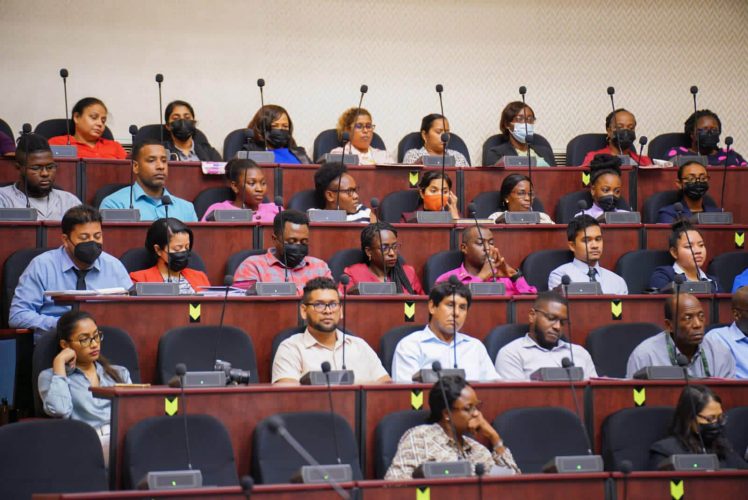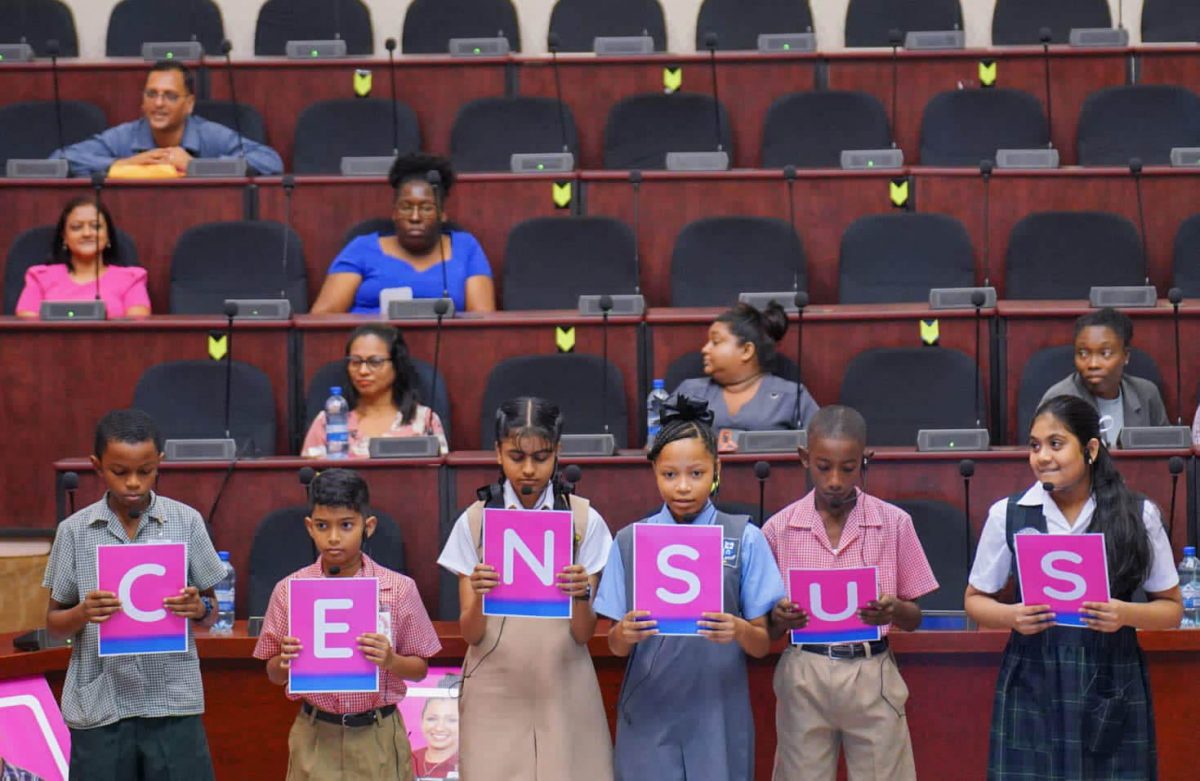The Guyana National Population and Housing Census was yesterday launched with President Irfaan Ali underscoring the importance of the data that will be collected, as he pleaded with the public to cooperate to ensure a successful exercise.
“A lot of questions are asked: What will be our migration policy? What will be our policy? What will be our national policy on meeting the labour requirement? What will be our immigration policy as a country? Well guess what, this census is critical in allowing us the opportunity to formulate those policies based on data,” Ali stressed as he delivered the keynote address at the Arthur Chung Conference Centre, in Liliendaal, Greater Georgetown.
Placing emphasis on the importance of data collection, not just to Guyana but globally, Ali said that with data in hand, the work of policymakers is about “75 per cent complete” and plans made going forward are guaranteed to be data driven.

While acknowledging that some of the questions on the census data collection sheet might seem personally intrusive to some persons and they might want to reject participating, the President assured that it is no different from what is done globally.
Using examples of how census data can be used, Ali reasoned. “If the census data shows us that 70 per cent of our graduates are coming out in a particular area but the country requires persons with this skillset in a different one, how then do we ensure the policies to create that shift in where the labour or the education output is focused? The census will give us a gateway with which we can formulate that labour market information system to meet our national development priorities and this is what is important.”
He added, “If it tells us that 12 per cent are immigrants or migrants from Venezuela in Guyana, that tells us we really need to be looking at a long-term strategy here. Because if you have migrants at 12 per cent of our population set and you are supporting this for the last two years, and you are projecting that the situation will not get better for the next three years or four years or five years, you talking about eight years. And if you are looking at human trend, if you are in a country for eight years, then one can basically assume these people will become permanent residents of your country. It is an assumption to hold but it is important on the planning cycle.”
Ali also referenced individual sectors and listed the benefits of statistical analyses as he implored the nation to cooperate.
‘Pillar’
Benefits of the census exercise were also stated by Caricom Deputy Secretary General (DSG), Armstrong Alexis, who also pointed out that the traditional census is said to be the most complex and massive peacetime exercise that a country can undertake.
“It represents a key pillar for data collection on the number and characteristics of the population of a country. Guided by the United Nations Statistical Commission Principles and Recommendations for population and housing censuses, the population and housing census forms the basis for an integrated national statistical system of data collection across many areas of statistics,” he explained.
Alexis posited that census-taking in Caricom has long been noted for the use of a regionally-coordinated approach, which he said is a well-established and proven strategy that provides for the use of uniform concepts and definitions, and a common core of questions in support of the collection of high-quality comparable census data.
The regionally-coordinated approach also promotes technical cooperation and the sharing of census expertise and facilities among Member States of the Caribbean Community, and in so doing seeks to achieve the census results in a cost-effective manner.
The Caricom Regional Strategy for the 2020 Round of Population and Housing Censuses was approved at the 38th Meeting of the Council for Human and Social Development (COHSOD) in 2019.
However, owing to the disruptions brought about by the COVID-19 pandemic, Alexis said that the regional body experienced some delays with the start of the field work.
Nonetheless, he yesterday announced that “across the length and breadth of the Caribbean, enumerators are out in the field and the counting has started.”
The overall objective of the Regional Census Strategy for the 2020 Census Round is to provide support in enabling the availability of timely, high quality and comparable Census Data for Planning and Decision-Making in the Caribbean Region, from the Population and Housing Census 2020 Round.
He said that this is in keeping with the objectives of the Action Plan for Statistics in CARICOM which has been endorsed by the Conference of Heads of Government.
In the region, he pointed out that two member states conducted their enumeration in 2021 and one of those countries has already produced its Census Report.
Approximately eight other countries will be conducting the census enumeration this year while another five are planning to conduct their enumeration in 2023, and one has indicated that field operations will be undertaken in 2024.
It is to this end that Caricom, according to the ASG, welcomes the progress that government has made “in Guyana and urges everyone to cooperate with the National Statistical Office when its enumerators come to your door or when you are otherwise contacted, so that no one is left behind and everyone gets counted.”
Cornerstone
In giving an overview of the census, Guyana’s Chief Statistician, Errol La Cruez, also pointed out that in the information age where data and statistics are crucial inputs to making better decisions, the census is the Gold Standard, since it provides the only complete and accurate measure of the entire population.
“The importance of the census cannot be emphasised enough. In the field of statistics, which utilises quantitative tools and techniques to glean important information, effectively analyse, and make inferences about proportions of the whole from a representative sample; the census sets the sample frame and enables the estimation of data with statistical confidence. It is the cornerstone and foundation of good data and statistics,” La Cruez said.
“Census data is invaluable at any time; however, it takes on even greater importance as Guyana undergoes a rapid transformation with enhanced economic and social development. Census data will inform numerous important decisions and investments that will be made in the coming decade by the government, private sector, international organisations, and others, that will significantly impact development in our communities,” he added.
He said that through the population count, the census data paints a picture of the country and society in numbers that provide meaningful information on demographic change, education, employment levels, the size and distribution of the labour force, the size and features of the housing stock, household access to utilities, agricultural data, food security, and other important socio-economic characteristics.
Even the most basic product, the True Population Count, is used as the benchmark and common denominator for assessing and tracking development. Metrics such as per-capita income, per-capita production, per-capita anything, all rely on the population count which comes from the census, the Chief Statistician highlighted.
To this end, he noted that Guyana’s population has been relatively constant since the 1970’s.
Census night
According to data collected, the average annual population growth rate was 0.15% for the 42 years between 1970 and 2012 moving from 701,718 to 746,955 persons. This is in contrast with the previous 39 years, (1931 to 1970) where the population grew at an average annual rate of 2.11%, from 310,933 to 701,718 persons.
“The burning question now is: With all the changes taking place around us, what do you think is our population in 2022?” he asked as he pointed out, “The census will provide the answer”.
In the coming weeks, thousands of enumerators and other staff of the Bureau of Statistics will spread out across Guyana, “on a mission to visit every building and household across this beautiful and majestic land of ours, to interview persons and take a count of everyone who is present within the territorial boundaries of Guyana on Census Night.”
Census Night, refers to the hours of darkness after mid-night of September 14 until the morning of Census Day, September 15. A count is also taken of those members of the household who may be outside the jurisdiction, so that data is had to give the most accurate population count and “accompanying data that plays a profound role in guiding policy and decision making at all levels.”
Enumerators, according to La Cruez, will work in “sun and rain, across all terrain: rivers, paved roads, dirt roads, jungle trails, mountain passes – to provide that accurate population count and crucial associated data.”
It is why he is also pleading with everyone to encourage each other to support this census and the enumerators.
“Ask for their identification cards, and cooperate with them. Spare some of your valuable time to answer their questions truthfully and to the best of your ability. Remember that all personal information provided is protected by law and kept in the strictest confidence, and will only be used or shared in aggregated form,” he assured.






